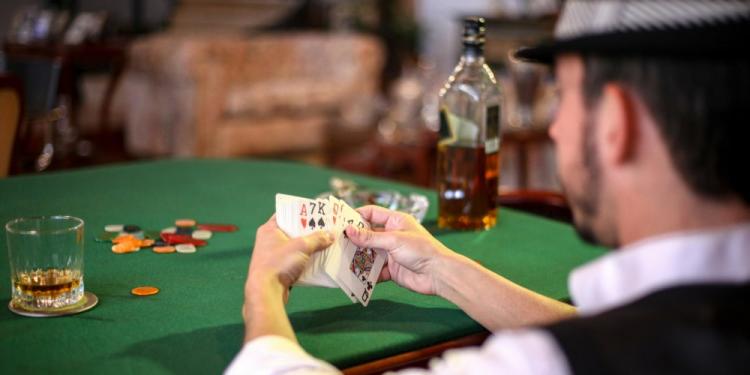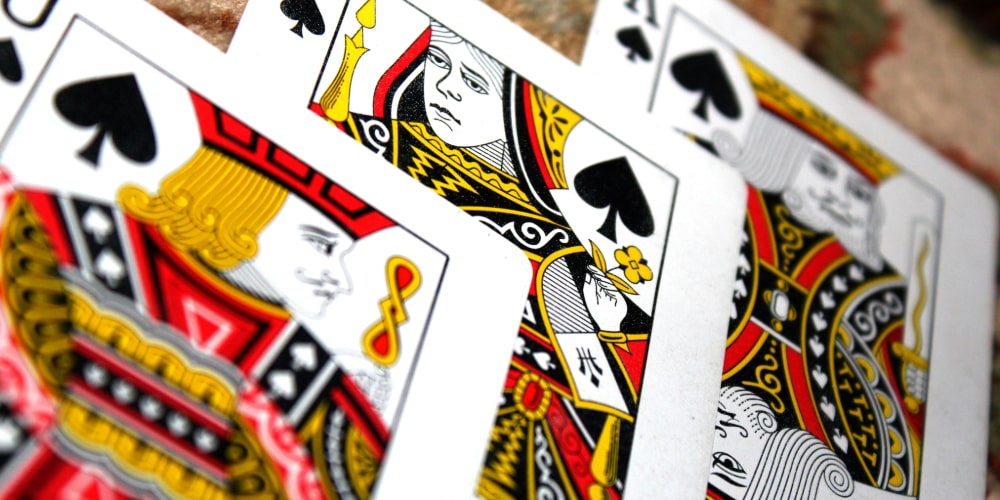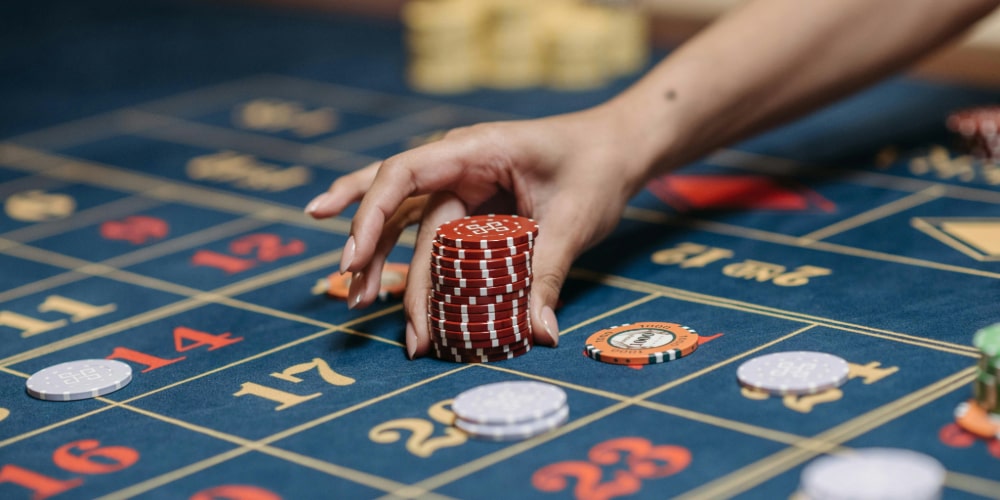A Bad Beat In Poker – How To Recover And Keep Playing
Posted: February 24, 2025
Updated: February 24, 2025
When it comes to the skilled casino table game of poker, everyone can have a bad day. However, what seperates the boys from the men is how well you can recover and even go on to grab the next pot. One's things certain, going full tilt isn't going to solve anything. Just step away from the table, compose yourself and return with a clearer head.

If you’re new to poker, welcome to a world where skill, strategy, and luck collide. Poker is a fascinating game that tests your mental agility as much as your ability to calculate odds. However, even the most seasoned players experience moments that feel like a punch to the gut—bad beats. A “bad beat” happens when you lose a hand despite playing it correctly. This is often because your opponent gets incredibly lucky. Bad beats can leave you reeling. Frustration, anger, and self-doubt can cloud your judgment and ruin your game. The ability to recover from a bad beat in poker is critical to your long-term success. In this Gamingzion.com article, you’ll learn practical strategies to manage your emotions. Also, we’ll give pointers in how to analyze your gameplay and build resilience.
The Psychology Of A Bad Beat
Bad beats are painful because they challenge your expectations. When you play a hand well and still lose, it creates cognitive dissonance—a mental conflict between what you expect (to win) and what actually happens (you lose). This disconnect can feel unfair, leading to intense frustration. From a psychological perspective, bad beats tap into loss aversion. This is the human tendency to feel the pain of a loss more acutely than the pleasure of a win.
The Harsh Reality Of Poker
Here’s a tough pill to swallow: bad beats are an inevitable part of poker. This is true whether you’re playing at a tournament in a real casino on the Las Vegas Strip or any of the top online casino sites in the US. The game’s inherent variance means that even the best players lose to luck occasionally. Accepting this reality is key to maintaining your emotional stability. Remember, your goal is to make consistently good decisions, not to win every hand.
Short-Term Tips To Recover From A Bad Beat In Poker
If you’re starting to feel the pressure, then here are some quick, on-the-spot solutions to help recover from a bad beat in poker. With practice, you’ll learn how to maintain better control over your short-term emotions.
Pause And Breathe
When a bad beat shakes you, the first step to regain control is to pause. A momentary break can be invaluable in helping you recover from a bad beat in poker. At a live table, take a deep breath and focus on slowing your exhale.

Deep breathing is a proven technique to lower your heart rate. It’ll bring a sense of calm, which is essential when emotions are running high. If you’re playing online at a top platform like Bet365 Poker, take advantage of the ability to sit out a few hands. Use this time to step away from the screen, stretch your body, and refocus your mind.
Shift Perspective
A bad beat can feel like a personal attack on your efforts. However, shifting your perspective can help soften the blow. Remind yourself that bad beats happen to everyone and are a natural part of poker’s variance. Instead of fixating on the outcome, focus on what the bad beat signifies: that you made a strong play. Forcing your opponents into bad decisions, even if they get lucky, is the essence of good poker. This mental reframing is crucial for learning how to recover from a bad beat in poker. It reinforces the importance of process over results. As such, it’ll encourage you to focus on your long-term strategy.
Immediate Coping Mechanisms
Sometimes the best way to recover from a bad beat in poker is to engage in a calming activity. Step away from the table and stretch, take a short walk, or listen to music that lifts your mood. These simple actions can help you shake off the frustration and regain mental clarity. Talking to a trusted poker friend or mentor is another excellent way to process your emotions. Sharing your experience with someone who understands the game can provide a valuable perspective.
Recover From A Bad Beat In Poker With Long-Term Strategies
Sometimes, you’ll need to work on longer term strategies in order to control tilt. These require constant practice through repetition.

As such, you’re trying to rewire your brain so that auto-responses to losing can be harnessed towards a more positive outcome.
Cultivate Emotional Control
Developing emotional discipline is one of the most important long-term strategies for success in poker. Emotional control allows you to manage “tilt,” the emotional instability that often follows a bad beat. Tilt can lead to reckless decisions, so learning to stay calm under pressure is crucial. One highly effective method to build emotional control is mindfulness meditation. Through meditation, you can learn to recognize when frustration is taking over and refocus your mind before it impacts your gameplay. With consistent mindfulness practice you’ll recover from a bad beat in poker with greater ease. Gradually, you’ll begin to see tilt as something manageable rather than inevitable.
Develop A Growth Mindset
A growth mindset transforms the way you view challenges, including bad beats. Instead of seeing them as failures, you can choose to see them as learning opportunities. Ask yourself questions like, what did I do well in this hand and what could I improve next time? By focusing on learning and improvement, you shift the narrative from one of defeat to one of progress. To recover from a bad beat in poker often requires this kind of perspective shift. Over time, this outlook will not only help you bounce back from setbacks but also enhance your overall skill level, making you a more confident and adaptable player.
Set Clear Goals And Expectations
Setting goals related to decision-making, rather than immediate results, can help you recover from a bad beat in poker more effectively. For example, aim to make the best possible decisions given the information at hand, regardless of the outcome. This approach keeps you focused on the bigger picture of your long-term profitability and skill development. It also helps prevent you from getting overly discouraged by short-term losses. By cultivating emotional control, adopting a growth mindset, and setting meaningful goals, you’ll develop the resilience needed to thrive in poker. These strategies not only help you recover from a bad beat in poker but also prepare you to handle the ups and downs of the game with confidence.
Recover From A Bad Beat In Poker With Emotional Insights
Once the emotions of a bad beat have subsided, it’s crucial to review the hand with a clear and objective mindset. Start by asking yourself whether your decisions were sound based on probabilities, opponent tendencies, and your position at the table. Did you play the hand in a way that maximized your long-term equity, or were there missteps in your strategy? To recover from a bad beat in poker, it’s essential to avoid results-oriented thinking. The outcome of the hand—no matter how painful—doesn’t necessarily reflect the quality of your play. Even the best decisions can lead to losses in the short term due to poker’s inherent variance. Focus on the process rather than the results, as this approach fosters consistent improvement over time.
Seek Constructive Feedback
Getting feedback from others can provide a fresh perspective on your play. Discuss the hand with experienced players, a trusted poker friend, or even a poker coach. They may spot aspects of the hand you hadn’t considered, such as subtle opponent tells or alternative lines of play. Additionally, take advantage of poker analysis tools or software. These tools offer an objective breakdown of your decisions and can highlight opportunities for optimization. Reviewing hands in this way reinforces good habits and reveals areas for refinement.
Incorporate Learning
Analyzing a bad beat isn’t just about confirming you made the right moves—it’s about identifying ways to improve. Could your bet sizing have been better? Was your read on the opponent accurate? By pinpointing specific areas for growth, you’ll turn the setback into a stepping stone, helping you recover from a bad beat in poker while becoming a stronger player.
Preventing Tilt After A Bad Beat
Tilt is an emotional state where frustration or anger takes control, leading to poor decision-making at the poker table or during a poker tournament. It’s a common response to bad beats and can spiral into reckless play. There are various types of tilt, each with its unique triggers and impacts.

Frustration tilt arises when anger clouds your judgment, causing you to play impulsively. Entitlement tilt occurs when you feel you “deserve” to win every hand. As a given, this leads to unrealistic expectations and disappointment. Revenge tilt is another form, where you aggressively chase losses, often targeting the player who delivered the bad beat. None of these factors are going to help you to recover from a bad beat in poker.
Building An Anti-Tilt Routine
Developing habits that keep your emotions in check can significantly reduce tilt’s impact. Start with pre-session rituals, such as reviewing your goals or listening to calming music, to set a focused and positive mindset. During the game, take notes on key hands to engage your analytical mind and shift focus away from emotional reactions. Repeating a mantra like “Focus on making good decisions” can serve as a mental anchor when frustration starts to build.
Avoiding Escalation
Sometimes, the best way to recover from a bad beat in poker is to step away. If you notice tilt creeping in, consider ending your session. Remember that quitting isn’t a sign of defeat. Here at Gamingzion.com, we look at this as a vital skill that protects your bankroll and mental health. Recognizing when to walk away will prevent further losses and give you time to regroup for your next game.
Building A Supportive Environment
Don’t be afraid to reach out to other more experienced poker players to gain their experience of tilt. You’ll learn first-hand how they developed coping mechanisms to help recover from a bad beat in poker.
- Poker Friends and Communities – It’s always a good idea to surround yourself with a supportive poker network. Joining forums or local poker groups can help you share experiences, learn from others, and gain perspective. Talking to fellow players who’ve been through similar situations can be incredibly reassuring.
- Coaching and Mentorship – Investing in a poker coach can also accelerate your development. Coaches provide tailored advice and help you refine both your strategy and mindset. They’re also a valuable resource when you’re learning how to recover from a bad beat in poker.
- Healthy Lifestyle Habits – According to online poker news in the US, our physical health directly impacts your mental game. We suggest a regime of regular exercise, proper sleep, and a balanced diet improve focus and emotional stability. Maintaining hobbies outside of poker also keeps your life balanced, making it easier to handle setbacks.
Case Studies Of Resilient Players
Even the world’s best poker players face devastating bad beats. Take Daniel Negreanu, for example. He’s known for his calm demeanor despite experiencing countless bad beats throughout his career. By staying focused on the long game, he’s remained one of poker’s most successful players. What can you learn from these pros? Persistence and adaptability are key. Professionals understand that success in poker is about making the right decisions consistently. It’s not about avoiding bad beats altogether. Use their stories as motivation to recover from a bad beat in poker and keep moving forward.
Play Better After You Recover From A Bad Beat In Poker
The truth is that bad beats are an inevitable part of poker. But it’s how you respond to them that defines your success. This comes from practicing emotional control, analyzing your play, and adopting a growth mindset. Remember, every session at a casino like Bet365 Poker is an opportunity to improve. Not just in poker strategies. But also in mental toughness. The ability to bounce back isn’t just a skill for poker. In truth, it’s a skill for life. Stay committed to your journey, and you’ll find that handling adversity well is what separates great players from the rest.
Click here to try the live casino at Bet365 Poker












